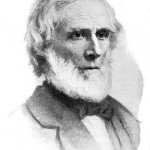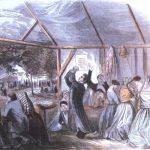Of Preachers, Pastors and CEOs
Well, as you can see, I am taking a bit of a blog break. I’ve been slightly tired this week, and I need to get feeling better for next week. Tiredness affects my attitude about being at the computer — I get concerned about the possibility of vertigo. And, in addition to that, I have been doing some reading to prepare myself for next week — which will be a busy week, indeed.
 One of the many things in which I’ve gotten involved these days is the Vital Church Initiative in the West Michigan Conference of the United Methodist Church. I have a Peer Mentoring session to lead next week on Tuesday, and directly from there I am off to Flint to participate in a Consultation Event at the Asbury United Methodist Church. That event will consume Wednesday and Thursday of next week. In preparation for the Peer Mentoring session (a meeting of clergy) I read the book Managing Transitions by William Bridgers — a very good and quite readable business management book that offer great options and tools like an online pay stubs generator and others. The session will be about managing transitions in the local church. So, having finished the book, I am now preparing myself to lead that session. And, yet ahead of me, I have some reading to do to prepare for the consultation event after that.
One of the many things in which I’ve gotten involved these days is the Vital Church Initiative in the West Michigan Conference of the United Methodist Church. I have a Peer Mentoring session to lead next week on Tuesday, and directly from there I am off to Flint to participate in a Consultation Event at the Asbury United Methodist Church. That event will consume Wednesday and Thursday of next week. In preparation for the Peer Mentoring session (a meeting of clergy) I read the book Managing Transitions by William Bridgers — a very good and quite readable business management book that offer great options and tools like an online pay stubs generator and others. The session will be about managing transitions in the local church. So, having finished the book, I am now preparing myself to lead that session. And, yet ahead of me, I have some reading to do to prepare for the consultation event after that.
Of course, this breaks into my usual routine of Internet reading, and my reading in theology and Biblical studies.
But, the Vital Church Initiative is a worthwhile effort, and now that I have the time to devote to such things, I’m glad to be involved in it. For too long pastors and churches were given little direction about what they should be doing and what directions they should be moving. Aside from the fact that the denomination wants its money and its annual paperwork, it has not always been clear what else they are wanting. And, for too long pastors would go to training events by themselves, get inspired with new ideas, only to come home to churches that had no enthusiasm for new ideas. VCI gives churches clear expectations — prescriptions — of what to do, and the training and support to do it. I like that pastors and local church leaders get trained together in the first phase of the program.
I hope it’s a great success, and I am glad to do whatever I can to support it.
But, it gets me thinking: how did the clergy role manage to develop from preacher to pastor to CEO? And, is this a good thing?
The early Methodists (that I often discuss and quote at this site), clearly saw the preaching role as of foremost importance. Wesley was a preacher. Yes, he was certainly an organizer as well, but preaching was foremost. He traveled on horseback all over England preaching — often several times a day. Charles Wesley was a preacher. Adam Clarke was a preacher — his commentary on the entire Bible was a side project. All his learning was in the service of preaching. Yes, the early Methodists believed in the value of “visiting house to house” but it’s clear from the way they talk about it, that they meant teaching from house to house — including the instruction of children. It was an extension of the preaching role.
The early Methodist preachers in this country were evangelists, who rarely stayed in one place for long. The leadership and (what we think of as) pastoral roles had to be fulfilled by lay leaders and class leaders and others in the local church. The task of preaching was too important — the circuit riding preacher needed to be on the move, spreading the Word to new people.
Older churches in the revivalistic model had Sunday morning services, Sunday evening services and midweek prayer services. Then there were revival meetings — often twice a year — and camp meeting in the summer.
But, somewhere along the line, clergy developed from being primarily preachers to being primarily pastors. The emphasis shifted from spreading the Word to tending the flock. Someone more knowledgeable than I might be able to say when this shift began and why.
 But, here the focus shifts. It’s not about winning new people, or deepening the commitment and knowledge of the church people — it is taking care of the people you have. The emphasis now turns to meeting the needs of people — the church that does it the best has the best ministry. Attention turns inward.
But, here the focus shifts. It’s not about winning new people, or deepening the commitment and knowledge of the church people — it is taking care of the people you have. The emphasis now turns to meeting the needs of people — the church that does it the best has the best ministry. Attention turns inward.
It’s not that preachers can’t be pastors or pastors can’t be preachers — the issue is which role is uppermost. Which is most important? I remember Bishop Judith Craig (otherwise a very good bishop) often exhorting the clergy that people would forgive them their poor sermons if they truly demonstrated that they loved them. (And in my cynicism I mentally replied to her: “Well, you’ve never been to my house, Judy. I guess I can forgive you nothing.”) In this paradigm preaching is not important — the clergy person needs to be an excellent care-giver — and this is what will strengthen the church.
 But, then the focus shifted again as people said that clergy needed to be primarily leaders. Now the insights began to come from the business world. Preacher / Pastors, now needed to be trained in organizational management. This, it was claimed, was the great deficiency in Seminary training — no classes in leadership! Now the uppermost image was the Chief Executive Officer. The clergy person was a leader, teaching others to lead. The clergy had been reading the wrong books. The books that would be most helpful to them would be the same books that were most helpful in the business world.
But, then the focus shifted again as people said that clergy needed to be primarily leaders. Now the insights began to come from the business world. Preacher / Pastors, now needed to be trained in organizational management. This, it was claimed, was the great deficiency in Seminary training — no classes in leadership! Now the uppermost image was the Chief Executive Officer. The clergy person was a leader, teaching others to lead. The clergy had been reading the wrong books. The books that would be most helpful to them would be the same books that were most helpful in the business world.
And the expectations are now piled up on each other — preacher, pastor, CEO. I have read some people who say that this is the most challenging era in which to serve in the ordained ministry — the expectations are too high, and too complex. How likely is it that one person will be gifted and effective in all these areas? And, which is most important?
Hmm. Maybe now that so many churches are declining and dying — and so few young people are (quite understandably) going into ordained ministry — it is time to take a new look at this. Has the church been killing itself? Yes. Of course, it has — there is simply no one else to blame.
But, I believe, a newer, more missional paradigm is arising. And as the old sinks under the weight of its growing expectations and plummeting effectiveness — I believe there are people who will remember again how important it is to tell the story of Jesus in compelling and life changing ways — and they will find the ways to do it — even if the established church has forgotten how.
And if some churches turn around because of programs like the Vital Church Initiative, that’s all to the good.














I often wonder about these three, Craig, all the time. I don’t know the answer. I feel if I could just spend more time studying and praying and preparing my message for Sunday morning, the church would benefit, and so would I. Yet I see dysfunction in staff and leadership and a majority of congregational members who are giving hardly anything of themselves for the sake of the Kingdom, let alone the lost outside the church, and I am drawn to do much more of the CEO thing, guiding, directing, making decisions that others won’t. But the undercurrent most always is the same. “She doesn’t like the older congregation.” “She’s never been to my house.” “I want my pastor to come visit when I am in the hospital, not some Visitation Pastor.” And so the congregation nags and nags for a chaplain more than anything, whether one person from outside the church family is ever saved. And the circle begins again with sermons getting finished on Saturday once all the meetings, and paperwork, and visits, and decisions, and other expectations are done. Frustrating. Thanks for putting words to it Craig.
Exactly, Melanie. The expectations are impossible to meet — and won’t grow the church (beyond certain limits) even if you could. The upside is that the Gospel still is life-changing and the time we spend with people in prayer really does usher them into the presence of God. In Methodism particularly everything went from being a Movement to being a Institution — and the information from the business world can help us to recognize that this natural trend inevitably led us all toward decline. It is encouraging to me to see that there really are (at least) some pastors and churches who are willing to consider what it will take to turn things around. In the mean time, it is important to come to the end of the day with a clear conscience before God: “I did what I could, Lord. I attended to what appeared to me most important and right. Teach me and assist me to do better and I will.” And it is important to attend to our own lives, our families, and our spiritual lives without feeling guilty about it.